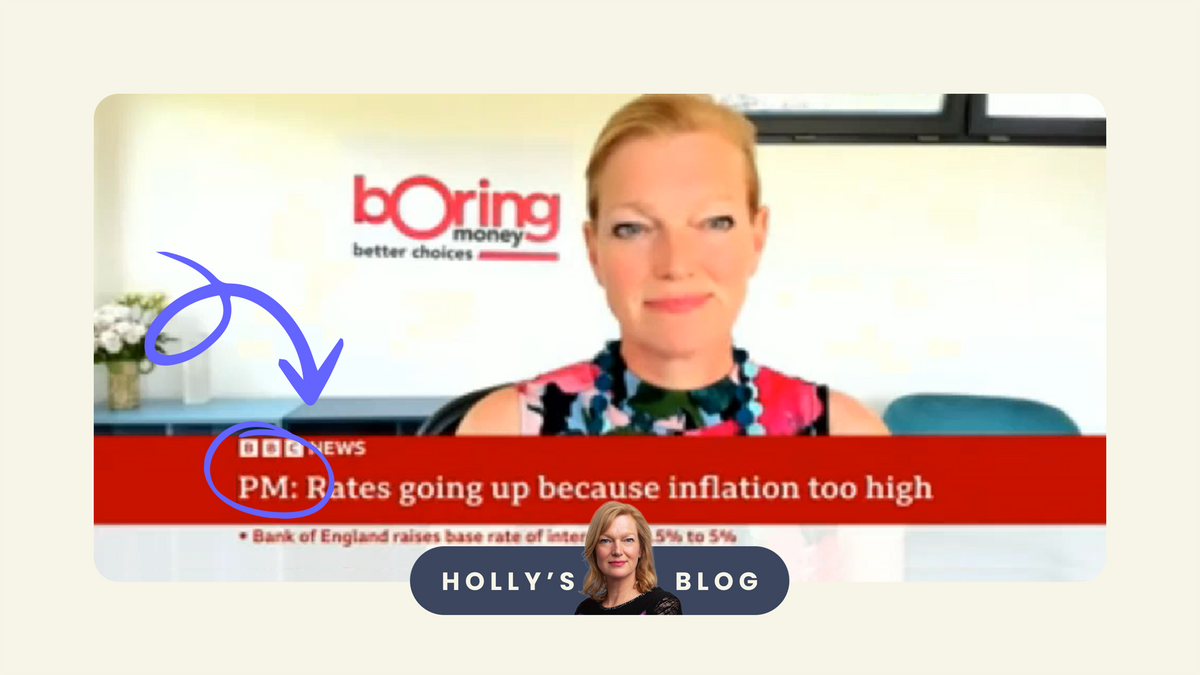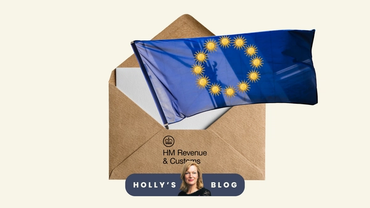A blog from your new Prime Minister
By Holly Mackay, Founder & CEO
23 June, 2023

I address you today as your new Prime Minister, after yesterday’s promotion by the BBC. From today I am removing all tax on champagne, making the oil firms pay people’s mortgages for a month, and introducing spot fines for irritating overuse of emojis. I’d also quite like to put Boris Johnson in the stocks, and never mind the SAS, I’d send my Mother into the Kremlin to… oh, time to stop?
In case I don’t get a mandate, back to the day job. Let’s unpack what’s going on.
Interest rate pain
Interest rates are up to 5%, levels not seen since 2008. Inflation is sticky and nasty core inflation – unlike in most other countries – is also up. So yesterday the Bank of England went Large. “WE. MEAN. BUSINESS”, they roared.
Gordon Brown gave the Bank of England independence about 25 years ago, so interest rates are not set by politicians locked in an eternal popularity contest with short timeframes. The Bank Guv’nor Andrew Bailey used to run the financial regulator so he’s used to not being on people’s Christmas card list.
Their mandate is pretty simple here – they have to bring down inflation. And they have a pair of rusty pliers (interest rates) to pull out a splinter (inflation). The whole point is that it hurts. It’s supposed to.
Markets suggest rates will increase to 6% by the end of this year. So what does this all mean?
Mortgage angst
The average payment for those on tracker mortgages will see an immediate hike of £50 a month.
If you’ve been on a fix of around 2% and renew at just over 6%, the average person would be paying over £400 a month more. Good God.
If your rate is set to expire in 6 months or less, then get onto a broker and get an offer for a fixed rate mortgage. You are generally not compelled to take this out and can re-apply if things fall. But it makes sense to at least lock in an offer now.
Avoid the Standard Variable Rate which you get rolled onto when your deal expires – avoid it like the plague. These are currently around 8%.
To fix, or not to fix? That is the question. As always with money stuff, it comes down to your preference – are you happy to pay potentially more in exchange for peace of mind and certainty? Or do you prefer to wait on the not unreasonable - yet not certain - assumption that rates will fall next year?
If you’re panicking, then talk to your mortgage provider. They do have a duty of care to vulnerable customers – and many more of us fall into this bracket today. Providers don’t want you to default and so being open and upfront is worth it. See what they can do? Having a budget before this call will help. If you haven’t done a budget before, it doesn’t need to be overcomplicated. You could just make a start with 3 months’ bank statements for example – and add up all your key expenditure in a number of main categories like housing, food, childcare, travel, bills and fun.
Some may rush to pay off some of their mortgage before the fix comes to an end. I always think, in this case, you should at least consider sticking the money into a good savings account which you can access before your mortgage ends should you still want to allocate the money to this – just buys you some flexibility and probably a better rate. The world’s uncertain now so keeping options open feels sensible.
If you have cash savings in your current account then – and yes, I’m looking at you – you are 99% likely to get a better deal if you move them, so do some research! The best one-year fixes are currently paying about 5.7%.
We will all notice the pinch. Fuel hikes had a disproportionate impact on lower income families. Mortgages are more egalitarian in who they hurt. If you have a £2 million mortgage on a castle, and your fix comes to an end, you’ll be paying about £6,500 more a month unless you can sell the North Turret. “Oh boo hoo”, you cry. Trouble is, people then don’t go out to dinner/beagling/shopping so much – and then we spend less, businesses suffer, they lay off staff and so the pain ripples out.
Two teeny consolation prizes
I’m really digging for some good news. Here goes. The average fuel bill is set to fall by about £50 a month from July. Hey ho.
And pensioners have a glimmer of hope ahead. If inflation is still as hardcore come September then the rise in the State Pension next April would go up to about £11,500. The Government will not upset pensioners in the year of a General Election so this ‘triple lock’ (which pegs the rise to inflation when it’s nasty) will likely kick in.
And what about markets?
As for the stock markets, the FTSE 100 fell a bit on the news, but is trudging along almost oblivious today, much like a hardened war correspondent who is hard to shock.
In part people think the pound will get stronger. Why? Well, if the UK is paying good rates, more people bring their money here. A stronger pound is not great typically for the FTSE 100 – lots of the Big Boys earn money overseas, and a strong pound makes their earnings look more puny. But any pain will not be evenly spread.
A thinktank has forecast that the average mortgage holder’s discretionary spend will fall by about 20%. If you think through what this all means, then the answer to “Who will do well?” is likely to be the same as the answer to “What stuff don’t we cut back on even when times are tough?” Healthcare, food, cleaning products, Pinot Grigio – y’know. The essentials. Investors call these ‘Consumer Staples’. [Editor’s note: Holly is the only analyst who thinks Pinot Grigio is a Consumer Staple.]
A rallying cry to Bank CEOs
“What are the Government DOING? Why don’t they come and help?” people are asking. Here’s the unpalatable truth. The increase in interest rates is doing pretty much exactly what they need it to do. It is taking money out of the system.
Yes, we can listen to economists say it’s about supply chains, and trade agreements and a wonky labour market, but none of that stuff can be fixed overnight. And other than interest rates, there ain’t much left in the tool bag.
What I do hope, is that whether from a sense of moral purpose, or because of a political kick up the corporate ass from Jeremy, we see some amazing leadership now from the banks. Customer service, talking to people, getting people on the phones, running mortgage clinics, re-examining rules and processes, thinking about deferred payments... who will step up? For every letter, text or call you make about higher mortgage payments, will you match that with the same correspondence about higher savings rates? And an invite to a mortgage Q&A with your people online?
You can’t take the pain away. But you do have some aspirin and sticking plasters in your toolkit.
Have a good weekend everyone. A final thought: at least we’re not in Turkey. This week they shoved up interest rates from 8.5% to 15%... 🤢
Holly

Want to get Holly's weekly blog straight to your inbox?
Already have an account? Login









